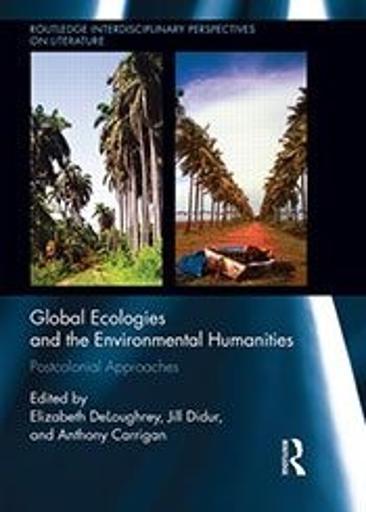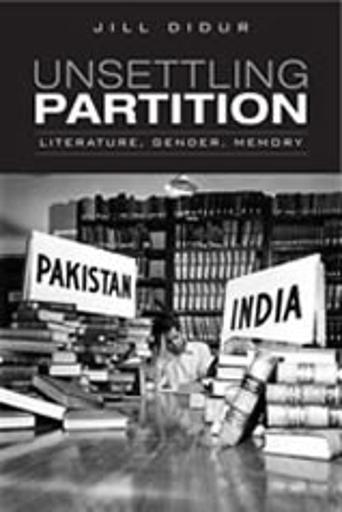
Dr. Jill Didur, PhD
Pronouns: she/her/elle
- Professor, English & Associate Dean Faculty Affairs and Inclusion, FAS, English
Are you the profile owner?
Sign in to editResearch areas: postcolonial studies, environmental humanities, plant studies, digital humanities, memory studies, Anthropocene studies, critical posthumanism, media studies, travel writing, disasporic studies, South Asian literature
Contact information
Email:
Website:
Biography
Jill Didur is Co-Director of the Speculative Life Research Cluster and Professor in English at Concordia University, Montreal. She is co-editor of (Post)Colonial Ports: Place and NonPlace in the Ecotone (2025), Global Ecologies and the Environmental Humanities:Postcolonial Approaches and author of Unsettling Partition: Literature, Gender, Memory.
Didur is also the Director of the Critical Anthropocene Research Group (CARG), a collaboration with faculty in Geography Planning and the Environment and English that investigates the cultural, historical and political roots of human-induced climate change with an emphasis on its origins in the history of empire, race,and globalization. These projects include research on the potentiality of language, narrative, aesthetic forms, and digital and material culture to redirect the culturally embedded positionality of ‘the human’ in our understanding of anthropogenic climate change. CARG also hosts a reading group and speaker series focused on scholars working in critical Anthropocene studies, energy humanities, critical plant studies, and postcolonial environmental humanities.
Didur is the creator of the locative media applications The Alpine MisGuide and Global Urban Wilds that explore the entanglement of colonialism, environment and sustainability. Her current SSHRC funded research (2014-2023) focuses on locative media,globalization, and environmental storytelling.
Didur supervises graduate students working in a wide range of areas, including the environmental humanities, critical Anthropocene studies, postcolonial and decolonial studies, contemporary literature and theory, South Asian literature in English, and critical posthumanism and plant studies.
She has recently published work on the colonial infrastructure (ports), the Plantationocene, the relation between botanical gardens and their colonial archives, urban wilds and settler environmentalism, postcolonial travel writing, (post)colonial botanical exploration and gardens, and the affordances of locative media for engaging citizen publics in environmental storytelling through embodied and affective pedagogies. Her work in postcolonial literary studies includes publications on South Asian literature in English, partition narratives,national discourse, gender and memory, the work of Gayatri Spivak, and secular discourse.
Primary research and teaching foci:
- Critical Anthropocene Studies
- Environmental humanities
- Plant Humanities
- Postcolonial literature, theory, and culture
- Decolonial and Diasporic studies
- Research creation and public green spaces
- Locative media and environmental storytelling
- Critical Posthumanism
- Plantations, gardens, and the history of empire
Didur serves on the Management Committee for the flagship journal Environmental Humanities (Duke UP) and the editorial boards of ARIEL: A Review of International English Literature (The John Hopkins UP) and Postcolonial Text (Open Access).
Education
Doctorate, English Literature, York University, Toronto
Master of Arts, English Literature, York University, Toronto
Bachelor of Arts (Honours), English Language and Literature, Queen's University, Kingston
Key Words
Postcolonial Literature and Theory / Critical Anthropocene Studies / Environmental Humanities / Plantationocene/ Locative Media Studies / South Asia / Partition / Secular Discourse / Historical Memory / Gender / Critical Posthumanism / Critical Plant Studies/ Cultural Studies / Travel Writing


Publications
Books
Articles and book chapters
Didur, Jill. "Introduction: Wading into the Wake" (Post)Colonial Ports: Place and (Non)Place in the Ecotone. Routledge, 2025:1-20.
Didur,Jill. “Reimagining the Plantation (ocene):MulkRaj Anand’s Two Leaves and a Bud” PostcolonialStudies. Special Issue: Planetary Solidarities” Postcolonial Theory, the Anthropocene and the Nonhuman.25.3 (2022): 340-360.
Didur, Jill. “Landscape and the Environmental Picturesque in Kiran Desai’s The Inheritance of Loss.” Teaching Anglophone South Asian Women’s Writing, MLA Options for Teaching, edited by Deepika Bhari and Filippo Menozzi. New York: MLA, 2021:330-341.
Didur, Jill and Lai-Tze Fan. “Between Landscape and the Screen: Locative Media, Transitive Reading, and Environmental Storytelling” Media Theory: Special issue, Geospacial Memory, 2.1(2018): 79-107.
Didur, Jill. "Walk This Way: Postcolonial Travel Writing and the Environment" Cambridge Companion to Postcolonial Travel Writing, London: Cambridge UP, (2018).
Didur, Jill. “‘The Perverse Little People of the Hills’: Unearthing Transculturation and Ecology in Reginald Farrer’s Alpine Plant Hunting.” Global Ecologies and the Environmental Humanities: Postcolonial Approaches, edited by Elizabeth DeLoughrey, Jill Didur, Anthony Carrigan. Routledge, 2015. 51-72.
DeLoughrey, Elizabeth, Jill Didur, Anthony Carrigan. “Introduction: A Postcolonial Environmental Humanities,” Global Ecologies and the Environmental Humanities: Postcolonial Approaches. edited by Elizabeth DeLoughrey, Jill Didur, Anthony Carrigan. New York: Routledge Press, 2015. 1-32.
Didur, Jill. “Guns and Roses: Reading the Picturesque Archive in Anita Desai’s Fire on the Mountain” Textual Practice,27.3, (2013): 499-522.
Didur, Jill. “Strange Joy: Plant-hunting and Responsibility in Jamaica Kincaid’s (Post)colonial Travel Writing” Interventions: International Journal of Postcolonial Studies. 13.2: (2011): 236-255.
Didur, Jill." Cultivating Community: Counter Landscaping in Kiran Desai's The Inheritance of Loss" Postcolonial Ecologies: Literature of the Environment,New York: Oxford University Press, 2011. 43-61.
Didur, Jill. “‘Gardenworthy’: Rerouting Colonial Botany in Jamaica Kincaid’s Among Flowers: A Walk in the Himalaya.” Public: Art, Culture, Ideas 41 (2010): 172-185.
Didur, Jill. "'An Unremembered Time': Secular Criticism in Pankaj Mishra's The Romantics" The Journal of Commonwealth Literature 44. 2 (2009): 65-85.
Didur, Jill. “Secularism Beyond the East/West Divide: Literary Reading, Ethics and The Moor's Last Sigh.” Textual Practice 18.4(2004): 541-562.
Edited volumes
Didur, Jill and Teresa Heffernan. "Revisiting the Subaltern in the New Empire. Special issue of Cultural Studies 17.1, 2003. (co-editor)
Simon, Bart, Jill Didur and Teresa Heffernan. Critical Posthumanism. Special issue of Cultural Critique 53, 2003. (co-editor)
Didur, Jill and Susan Gingell. "Author Meets Critics: Julia Emberley's Defamiliarizing the Aboriginal:Cultural Practices and Decolonization in Canada." Topia: Canadian Journal of Cultural Studies 23-24 Summer 2010: 388-428.
Reviews
Didur, Jill. “Provincializing Ecocritism: Rob Nixon’s Slow Violence and the Environmentalism of the Poor” Contemporary Literature 53, (2012): 585-591
Didur, Jill. “Sangeeta Ray, Gayatri Chakravorty Spivak: In Other Words.” Postcolonial Text 6.1 (2011): 3 pages
Didur, Jill. “Clara Joseph, The Agent in the Margin: Nayantara Sahgal’s Gandhian Fiction.” The University of Toronto Quarterly 80.2, (2011): 374-376.
Didur, Jill “America Inside Out: Inderpal Grewal’s Transnational America” Topia: A Journal for Canadian Cultural Studies 17 (2007): 162-165.
Didur Jill “Daniel Coleman’s White Civility” Chimo: The Newsletter for the Canadian Association for Literature and Language Studies 58 (2007): 11-14.
External Research Funding
2015-16 SSHRC Connections Grant (Co-applicant) "Infrastructure, Environment and Life in the Anthropocene" ($17 620).
2014-2015: SSHRC Connections Grant (Co-applicant) "The Emergence of Botanic Gardens and Leaders in the Governance of Biodiversity Conservation" ($17 600)
2013-2018: FRQSC - Centre de recherche (Collaborator) “Figura: Centre de recherche(UQAM & Concordia)” ($300 000).
2013-14: NSERC GRAND NCE (Collaborative Network Investigator) "Indiegame" ($2 500).
2008-2012: SSHRC Standard Research Grant, (Principal Investigator), “Gardenworthy: Planthunting in South Asian literature and travel writing.” ($55 600).
Participation activities
Selected conference papers / readings / talks
Didur,Jill. “Shadow Places and the Environmental Picturesque in Kiran Desai’s The Inheritance of Loss” Ecotones 4 - Partitions and Borders at Centre for Studies in Social Sciences Kolkata, December 13-15, 2018.
Didur, Jill “Beyond Anti-Conquest: Unearthing the Botanical Archive with Locative Media” Avoiding Eco-cidal Smart Cities Workshop,Participatory Design Conference, Hasselt & Genk, Belgium, August 20-24,2018.
Didur, Jill. “‘Cha rery’: Diasporic Tea Routes in Mulk Raj Anand’s Two Leaves and a Bud”. Association for Commonwealth Literature and Language 16th Studies Triennial Conference, Saint Lucia, August 5-9, 2013.
Didur, Jill. "Mis-Guided Narratives: Locative Media in Globalized Environments " Accepted for presentation at the Annual Conference of the American Comparative Literature Association, University of Toronto, April 4-7 2013. (Presenter and Seminar Stream Co-Organizer for Repositioning Narrative: Locative Media/ GPS/ Mobile Literature).
Didur, Jill. “The Perverse Little People of the Hills”: Global Ecologies and Species Interdependence in Reginald Farrer’s Alpine Plant-Hunting”. Global Ecologies: Nature/Narrative/Neoliberalism, March 7-9, 2013 UCLA.
Didur, Jill. “Guns and Roses: Reading the Picturesque Archive in Anita Desai’s Fire on the Mountain” Annual Conference of the American Comparative Literature Association, Brown University, Providence, Rhode Island, March 29-April 1, 2012.
Didur, Jill. “Postcolonial Ecologies Round Table” European Association of Commonwealth Literature and Language Studies, Istanbul, Turkey, Bogazici (Bosphorus) University, April 26 to 30, 2011.
Didur, Jill. “Slow Violence and Lepcha Cosmology in Kiran Desai’s The Inheritance of Loss” Chotro III: Local Knowledges & Global Translations. The Association of Commonwealth Literature and Language Studies / Bhasha Research and Publication Centre / Developing Countries Research Centre, New Delhi/Shimla, India. September 11-16 2010.
Didur, Jill. "The Picturesque Archive: Countercolonial Landscapes in Postcolonial Fiction”. Critical Landscape Studies Panel, Canadian Communications Association Annual Meeting, Concordia University, Montreal. June 3, 2010.
Links
Launch of mobile app: Alpine Garden MisGuide at the Jardin Botanique de Montreal
https:// www.concordia.ca/cunews/main/stories/2015/06/03/alpine-misguide-botanical-garden-montreal-jill-didur.html

